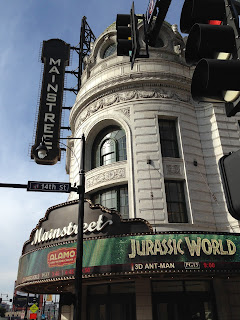Even the more famous twin KC cannot hold the candle to Minneapolis and that isn't only because they are still laying their trolley track while Minneapolis is already running several full scale LRT lines. Minneapolis has cooler architecture when it comes to museums and stadia, but then, Kansas Kauffman Center for the performing arts was once probably quite a head-turner, although I am not sure if it was always this Calatrava meets Saarinen design or just Saarinen with the glass and cable trusses as a later update. But today it doesn't compare in fame to Nouvel's Guthrie theater in Minneapolis. KC's Kemper Museum is no match for the Modern Wing of the BMA in Baltimore to bring the matter back home.
Talking about back home, crime happens in KC as well, as I saw first hand this morning when I almost collided with a black pick-up truck coming along on shreds of tires and smoking rims followed by ten or so police cruisers whose collective sirens had stopped me dead in my track in spite of the green light. Which was a good thing because the thieves or drug dealers in the truck apparently were heayily armed as I learned later on. That was near downtown, I may add. But I am digressing.
KC seems to be in fine shape, with 450,000 residents it is smaller than Baltimore but still growing. Estimates indicate that it will have added more than 10,000 households in less than four years. Its historic districts are small (Westport, City Market)) and are no comparison to Fells Point or the German Village in Columbus (see part 1 of my reports) or Soulard in St Louis (see part 2 of my reports).
Like St Louis, KC is fragmented by expressways and the ubiquitous surface parking lots. Still, it has bike- sharing, it will soon boast a downtown trolley and there is an arts district called Crossroads centered around Baltimore Avenue and 19th Streets that includes restaurants, galleries, artists lofts and weedy leftover spaces in between. Apartments buildings go up everywhere and all that without really having a waterfront in spite of the mighty river. Maybe I just couldn't find it but it seems like that waterfront is severely impacted by steep terrain, railroads, freeways and power plants and those things that traditionally got prime spots along our waterways. Oh yes, there is also a public market, but on Tuesday morning at nine it was a total snoozer.
Klaus Philipsen, FAIA
all photos ArchPlan Inc.
 |
| view of downtown KC from the north |
 |
| the City Market, a large complex with indoor and outdoor areas |
 |
| the convention district with its large hotels and the Basilica of the Immaculate Conception with its golden top |
 |
| The Church sits in a historic part of town that now is dubbed "Quality Hill" |
 |
| shallow slab embedded track construction for a new trolley |
 |
| in the arts district "Crossroad" dreams are high for the power of artists to be urban pioneers |
 |
| Kansas isn't all flat, downtown seen from the arts district looking north |
 |
| converted fire house design studio |
 |
| the disruptive nature of inner urban freeways, even if like in Kansas a convention hall sits on top |
 |
| the historic Westport, now a place of beer drinking |
 |
| The Kemper Museum of contemporary Art |
 |
| Old time neighborhood pub in the historic Market Area |
 |
| an older bank and a modern office building, contrasts very common in Kansas and many other places |
 |
| Kansas has a very long Main Street, here the theater district (Gas and Light) |
 |
| an adaptive reuse of this large art deco landmark in the Gas and Light District is underway, fittingly on Baltimore Avenue |
 |
| vast expanses of surface parking can be found many places. Here right adjacent to historic Westport |
 |
| large art on loan from Brooklyn: Adam Cvijanovic at the Kemper (American Montage) |
As an East Coaster who lived in KCK for a year, I very much enjoyed seeing these recent photos of the twin city area. KC is probably best known for its many water fountains across the city:: beautiful, especially in the summer.
ReplyDelete